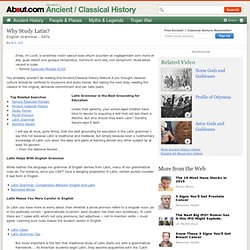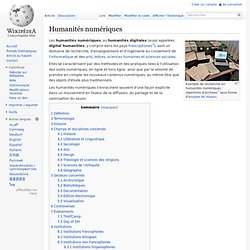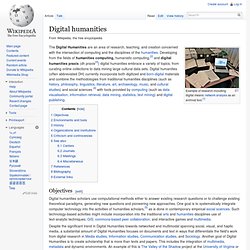

Why Study Latin - Advantages of Studying Latin. Erras, mi Lucili, si existimas nostri saeculi esse vitium luxuriam et neglegentiam boni moris et alia, quae obiecit suis quisque temporibus; hominum sunt ista, non temporum.

Nulla aetas vacavit a culpa. -- Seneca Epistulae Morales XCVII You probably wouldn't be reading this Ancient/Classical History feature if you thought classical culture should be confined to museums and dusty tomes. But taking the next step, reading the classics in the original, demands commitment and can take years. Latin Grammar is the Best Grounding for Education Unlike their parents, your school-aged children have time to devote to acquiring a skill that will last them a lifetime. I will say at once, quite firmly, that the best grounding for education is the Latin grammar.
Latin Helps With English Grammar While neither the language nor grammar of English derives from Latin, many of our grammatical rules do. Latin Makes You More Careful in English Latin Helps You Maximize SAT scores. UOH - Cours de lettres classiques. Humanités numériques. Un blog sur les Humanités Digitales. Humanités numériques. Un article de Wikipédia, l'encyclopédie libre.

Exemple de recherche en humanités numériques : répertoire d'archives[1] sous forme d'analyse de réseau. Elles se caractérisent par des méthodes et des pratiques liées à l'utilisation des outils numériques, en ligne et hors ligne, ainsi que par la volonté de prendre en compte les nouveaux contenus numériques, au même titre que des objets d'étude plus traditionnels. Les humanités numériques s'enracinent souvent d'une façon explicite dans un mouvement en faveur de la diffusion, du partage et de la valorisation du savoir. Définition[modifier | modifier le code] Manifeste des Digital Humanities - FR Les humanités numériques peuvent être définies comme l'application du « savoir-faire des technologies de l'information [et de l'informatique] aux questions de sciences humaines et sociales »[3] . « 1. Il arrive que les humanités numériques soient assimilées à l'« humanisme numérique » que propose Milad Doueihi dans Pour un humanisme numérique (2011).
Why Your Kids Should Study Latin - Other Related Sites. "WHY LATIN" Page 1, 2, 3, 4 Why Study Classics For the sake of law, medicine, writing, technology, and teaching, according to this Drew University site: [03/17/98] www.depts.drew.edu/%7Eclassics/why_classics.html.

Why Study Greek and Latin Classics? This Notre Dame site says to learn to read and write carefully, for rhetoric, tradition, for reasons of faith and the quest for meaning, and for the sake of educational opportunities: [ 03/17/98] www.nd.edu/%7Ecol/whyclassics.html. Total Physical Response Storytelling (Source from 03/17/98 - ) Ideas on how to make vocabulary acquisition less of a chore. Why Bother Learning Latin? - Latin Dictionary and Grammar Resources - Latdict. “Who cares?

It’s a dead language.” Yes, people still say this to me on occasion. But fear not! Latin is not dead! Ask any language scholar and they will effectively say the same thing when you look at things in the right context. This statistic helps to illustrate Latin’s pervasiveness in other languages, even non-Romance languages: I will say again, English is not a Romance language. So, how is this all useful? If you learn Latin, you’d have familiarity with many English words that you may not have ever seen before. Latin is a prime gateway to learning other languages in general, mainly because so much of Western grammatical understanding comes through the lens of both Greek and Latin. Aside from that, learning Greek would also be beneficial as well. Digital Humanities. Digital humanities. The Digital Humanities are an area of research, teaching, and creation concerned with the intersection of computing and the disciplines of the humanities.

Developing from the fields of humanities computing, humanistic computing,[2] and digital humanities praxis (dh praxis[3]) digital humanities embrace a variety of topics, from curating online collections to data mining large cultural data sets. Digital humanities (often abbreviated DH) currently incorporate both digitized and born-digital materials and combine the methodologies from traditional humanities disciplines (such as history, philosophy, linguistics, literature, art, archaeology, music, and cultural studies) and social sciences [4] with tools provided by computing (such as data visualisation, information retrieval, data mining, statistics, text mining) and digital publishing.
Objectives[edit] A growing number of researchers in digital humanities are using computational methods for the analysis of large cultural data sets.